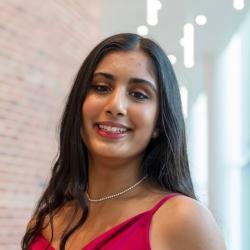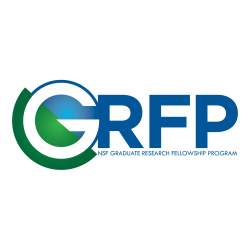UMD Computer Science Major Bhavika Buddi Awarded 2025 NOAA Hollings Scholarship
Awardees receive up to $19,000 and a paid 10-week internship with the National Oceanic and Atmospheric Administration.
Growing up in Oregon, University of Maryland sophomore computer science major Bhavika Buddi witnessed firsthand how extreme weather events transformed her home state. Year after year, she watched wildfires grow more intense and heat waves more severe, threatening the forests and coastlines where she spent her childhood hiking, biking and exploring.
Since then, Buddi turned her connection with nature into research that could help communities adapt to climate change impacts. Her work at the intersection of computer science and environmental science earned her one of the nation’s highest honors for undergraduate researchers in these fields: a 2025 Ernest F. Hollings Undergraduate Scholarship from the National Oceanic and Atmospheric Administration (NOAA).
She was one of three UMD students this year to receive this scholarship, which provides up to $19,000 in financial support, professional development opportunities and a 10-week paid summer internship at any NOAA facility across the U.S. With this year’s recipients, UMD’s total number of Hollings Scholars since 2008 rises to 48.
“I’m so excited to get this opportunity,” Buddi said. “I hope that my experience at NOAA will help me further develop my interdisciplinary skills to directly address the challenges of extreme environmental events. I really want to use technology as a tool to help people prepare for and adapt to these increasingly severe phenomena.”
Under the mentorship of Assistant Research Professor Kathleen Kennedy at UMD’s Center for Global Sustainability, Buddi established herself as a promising interdisciplinary researcher by applying data analysis techniques to address real-world environmental policy issues.
“I conducted detailed data analysis to get a comprehensive picture of small businesses in Maryland and classified each business based on how the renewable energy transition might affect them,” Buddi explained. “My team looked at businesses across different industries and identified which would be the most impacted by shifts to renewable energy sources.”
The research culminated in a report that the team presented directly to Maryland state officials and legislative stakeholders.
“Gathering this data and interpreting it was very important,” Buddi said. “We provided our policymakers with crucial information that they can use to help support small businesses in our area with the clean energy transition. It’s a big step in how we can collectively address environmental issues and make informed decisions about them together.”
Buddi’s experience of applying data science to environmental policy proved transformative. She hopes the Hollings Scholarship will allow her to continue doing similar research, ideally at a NOAA unit like the Office of Atmospheric and Oceanic Research, which enables better, more accurate forecasts and earlier warnings for natural disasters.
“I’d like to learn how to utilize AI and machine learning for computational modeling,” Buddi added. “I see these tools as ways to analyze and predict vast quantities of data better and faster, which is essential when it comes to dealing with climate-related disasters.”
Looking to the future, Buddi plans to eventually pursue a master’s degree to expand her research skills and then apply those skills at a university or government agency like NASA or NOAA. She sees her upcoming internship as an opportunity to learn from the country’s best meteorologists and atmospheric scientists, putting her at the forefront of natural disaster prediction and emergency response research.
“My overall goal is to work in disaster recovery, response and preparedness,” Buddi said. “I’d like to work in modeling and better understand these environmental changes so that I’ll be able to better communicate the science to the people who are most impacted by the climate crisis.”







